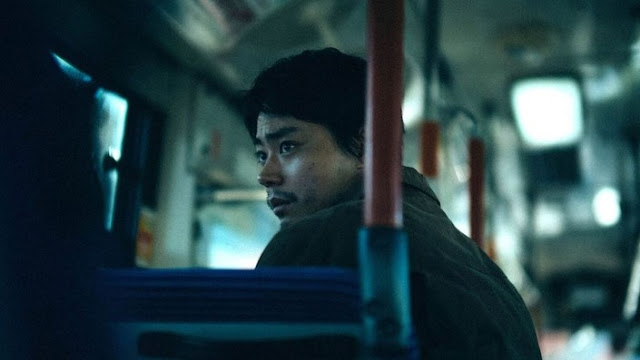Cloud
Kuraudo ~ クラウド
Writer & Director ~ Kiyoshi Kurosawa
2024, Japan
Stars ~ Masaki Suda, Kotone Furukawa, Daiken Okudaira
Ryôsuke Yoshii (Masaki Suda) is an online reseller, so much in his bubble that he’s unaware and uncaring of what effect his business has on buyers. He says he sells things before he even knows if they are fake. There are clues, sure, like dead animals left on his doorstep, but he’s indifferent. He works in a factory as a front, seemingly has a freewheeling girlfriend with whom he talks about an idyllic future, but reselling would seem to be his passion. They’re both ambitious and their dreams of living a more adorned, carefree life have the feel of adolescent lovers.
With no music or melodrama to prepare you, the straightforward, seemingly unfussed, precise presentation of the first half does not openly gesture where the second will go (although a poster does give it away). It feels like a character piece until it turns into a thriller. The film is interested in the direct line between online hate groups and lynch mobs, in the dislocation of online existence that can delude someone that there are no consequences for their actions; that they are not responsible and that a digital world gives them an immunity. What emerges is the portrait of customers so rightly aggrieved by internet scammers that their sense of impotence and outrage metastasises into something psychotic. For formerly apathetic Yoshii’s part, it’s a rude awakening and revelation of the full extent and repercussions of his sociopathy. (So, I don’t agree with PeterSobczynski that it devolves into “just another empty shoot-em-up.”)
Kurosawa is known for his disturbing slow-burners ‘Cure’, ‘Pulse’, ‘Creepy’, but there’s also the straight but disquieting drama ‘Tokyo Sonata’ to highlight how much he’s interested in human dynamics. ‘Cloud’ becomes a thriller in the same way that ‘A Brighter Summer’s Day’ also aligned with the gangster genre, or ‘Custody’ and ‘Parasite’ with horror tropes, or even ‘Burning’s hinting at the serial killer genre. None of these let the excursions into side-genres usurp the character drama, and even if ‘Cloud’ embraces its shoot-out in an abandoned factory set-piece, it never loses its perspective of a bewildered Yoshii finding himself in a full-throttle thriller scenario.
Yoshii remains an enigma until the very end; an ending that implies that he has been equally a mystery to himself. Yet it seems that those around him know exactly what he is – an opportunity, it ultimately appears. It’s certainly a narrative critical of the displacement and anger that the online world can induce, although with its end beats it makes clear that we are no less fooled and conned in the real world by ourselves and others.
‘Cloud’ makes for a vaguely elusive treatise on the modern condition, on fraud, on culpability and aggrievement, but under the guise of a direct if pensive shoot-out. It’s an off-kilter revenge thriller from one angle and a slightly opaque character study from another in a world of fraud and aggrievement. ‘Cloud’ hits both the enjoyment marks for fans of slow-burn and of thriller cinema whilst shuffling your allegiances to who’s the good guys, if any. For Alex Papaioannou, it is a film “just so inherently angry and saddened by the state of humanity.” And that’s what makes it fascinating beneath a deceptively patient veneer and its excellent final set piece.







